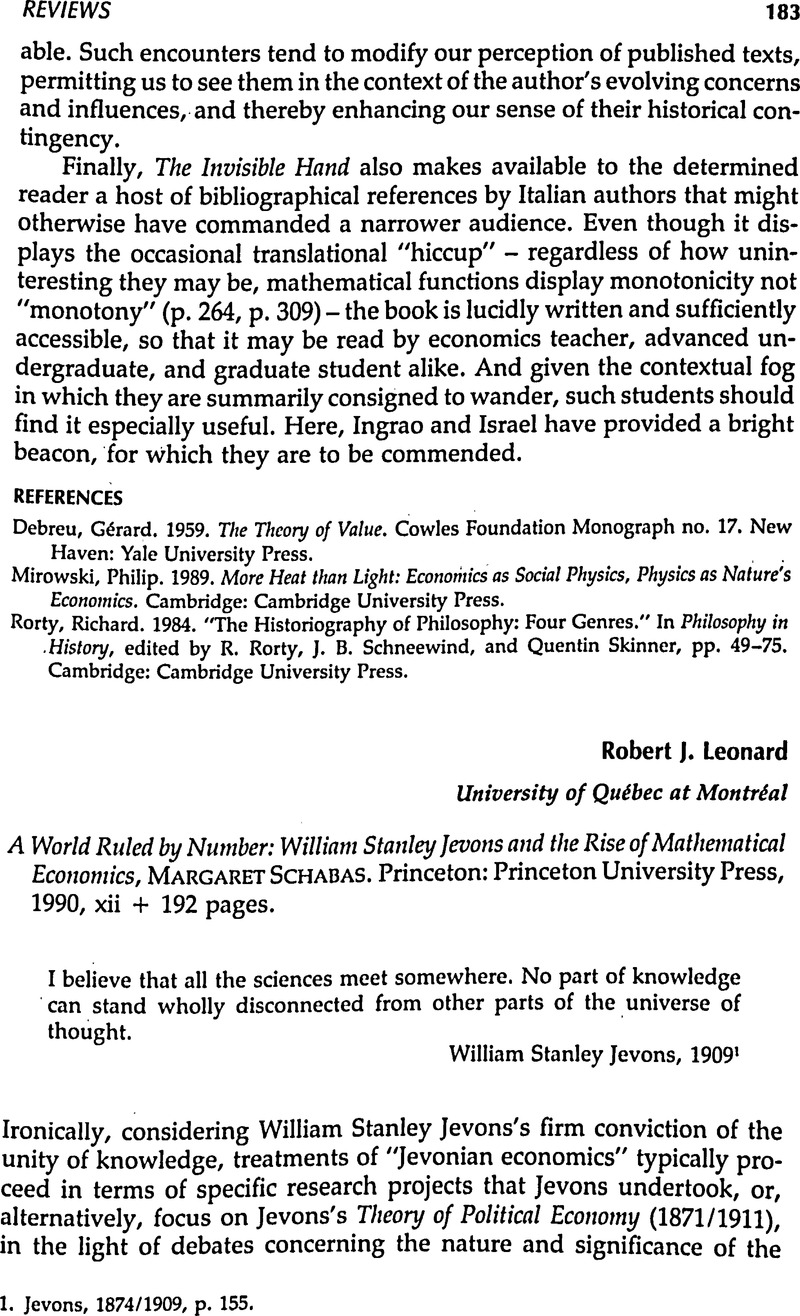No CrossRef data available.
Article contents
A World Ruled by Number: William Stanley Jevons and the Rise of Mathematical Economics, Margaret Schabas. Princeton: Princeton University Press, 1990, xii + 192 pages.
Published online by Cambridge University Press: 16 October 2009
Abstract
An abstract is not available for this content so a preview has been provided. Please use the Get access link above for information on how to access this content.

- Type
- Reviews
- Information
- Copyright
- Copyright © Cambridge University Press 1993
References
REFERENCES
Aldrich, John. 1987. “Jevons as Statistician: The Role of Probability.” Manchester School XL:233–53.CrossRefGoogle Scholar
Black, R. D. Collison. 1972. “W. S. Jevons and the Foundation of Modern Economics.” History of Political Economy 4:362–78.CrossRefGoogle Scholar
Bostaph, Samuel, and Yeung-Nan, Shieh. 1987. “Jevons' Demand Curve.” History of Political Economy 19:107–26.CrossRefGoogle Scholar
Hutchison, T. W. 1978. On Revolutions and Progress in Economic Knowledge. Cambridge: Cambridge University Press.Google Scholar
Jevons, William Stanley. 1879. “John Stuart Mill's Philosophy Tested, iv. Utilitarianism.” Contemporary Review 36:521–38.Google Scholar
Jevons, William Stanley. 1887. (first ed. 1882). The State in Relation to Labour. London: Macmillan.Google Scholar
Jevons, William Stanley. 1909. (first ed. 1874). The Principles of Science, A Treatise on Logic and Scientific Method London: Macmillan.Google Scholar
Jevons, William Stanley. 1911. (first ed. 1871). Theory of Political Economy, 4th edition, edited by Jevons, H. S.. London: Macmillan.Google Scholar
Jevons, William Stanley. 1965. (first ed. 1905). Methods of Social Reform and Other Papers. London: Macmillan.Google Scholar
MacLennan, Barbara. 1972. “Jevon's Philosophy of Science.” Manchester School XL:53–71.CrossRefGoogle Scholar
Marshall, Alfred. 1981. (first ed. 1872). “Mr. Jevons' Theory of Political Economy.” In Papers and Correspondence of W. S. Jevons. Vol. 7: Papers on Political Economy, edited by Black, R. D. C., pp. 141–46. London: Macmillan.Google Scholar
Mays, W. P. 1962. “Jevons' Conception of Scientific Method.” Manchester School XXX:223–49.CrossRefGoogle Scholar
Mill, John Stuart. (1967). Collected Works of John Stuart Mill. Vol. IV: Essays on Economics and Society. Edited by Robson, J. M.. Toronto: University of Toronto Press.Google Scholar
Mirowski, Philip. 1984. “Physics and the ‘Marginal Revolution’.” Cambridge Journal of Economics 8:361–79.CrossRefGoogle Scholar
Mirowski, Philip. 1988. Against Mechanism Protecting Economics from Science. Rowman & Littlefield.Google Scholar
Mirowski, Philip. (1989). More Heat Than Light. Cambridge: Cambridge University Press.CrossRefGoogle Scholar
Robbins, Lionel C. 1972. “The Place of Jevons in the History of Economic Thought.” Manchester School XL:310–25.Google Scholar
Stigler, Stephen M. 1982. “Jevons as Statistician.” Manchester School L:354–65.CrossRefGoogle Scholar
White, Michael V. 1991. “The Reswitching Problem: Why did Jevons Write the Coal Question?” (unpublished manuscript).Google Scholar
Young, Allyn A. 1912. “Jevons' ‘Theory of Political Economy’.” American Economic Review 2:576–89.Google Scholar


